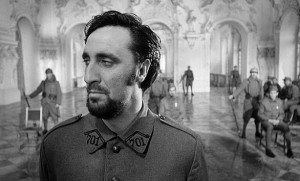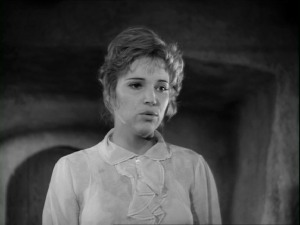#538 PATHS OF GLORY Stanley Kubrick 1957
It is weirdly appropriate, furthermore, that the film should be filmed in English, even though the story takes place in France, with French names all around. That strange cinematic convention somehow binds the actors to the universality of the themes here, especially when you throw in an English girl playing a German who is, essentially, a prisoner of the war. Her innocence might have served to highlight more brutal themes of the war, but the placement of the song at the absolute end of the last reel ensures a more appropriate–and hopeful–note. There are fascinating articles written by soldiers and writers of war who present the ultimate dilemma in the war film genre: how do you protest war while showing it? how can you demonstrate the vile brutality of it without showing same? War films have been compared to pornography in this regard. In Jarhead, the soldiers would pump themselves up by watching Apocalypse Now–surely an anti-war film from Coppola’s point of view. As David Simon points out, “an anti-war film always becomes a war film: but not Paths of Glory” (see his brilliant commentary on the connection between Paths of Glory and The Wire on the Criterion Channel or YouTube).
Kubrick dances so well with this potentially fatal cycle of war criticism/glorification. He starts by blatantly assigning an irreconcilable irony to the title. And not to be pedantic but I would say adding an “s” to “Path” and making that word a plural in turn “pluralizes” the outcome: there are several paths to glory, and not necessarily only the one that the officers in this film inflict upon the men, and which they assume to be THE path, singular, to “glory.” For instance, the priest (surely a representative of the authority class) offers the condemned (ironic) “innocents” another “path:” that of eternal salvation. Predictably, one takes a false refuge in this glimmer, but the other will have none of it–an interesting footnote reaching through the story criticizing the vacuous heart of a Judeo-Christian tradition intimately tied to the righteousness of wars and crusades for hundreds of years; this righteousness, curiously, diminishes the individual, even as it purports to save him or her especially. What Kubrick ultimately “glorifies” here is the enduring humanity of the individual soldier even as he is faced with the inherent (and almost obligatory) inhumanity of the war machine. It is always difficult to dance with the cliches intimately tied into such a discussion: Kubrick neatly evades cliche with, of course the girl at the end, but also through the casting of Kirk Douglas in the role of the father-patron-executioner. He can not save his children, but he can cast at the very least a legal punishment on one who would mangle basic principles in the name of victory in battle (the “best” path to “glory”). His very dominance on the screen painfully underscores his impotence. A faceless actor might have produced an outcome dimmed in its Pathos.
On the other side of that Aristotelian coin, Private Maurice from the photo above infuses some Bathos into the discussion. There is nothing funny here, but it seems that just as the officers are always amused about something, the soldiers find a desperate ridiculousness inherent in their plight. The Private’s bitterly sardonic comment serves to throw the foolishness and cruelty of the senior officers back in their faces. The fact that the kangaroo court takes place in such impossibly luxurious rooms (from a frivolous, bygone age whose peasantry built the pyramids, so to speak) adds to the tragicomic turns, and the inadequacy of the court.


